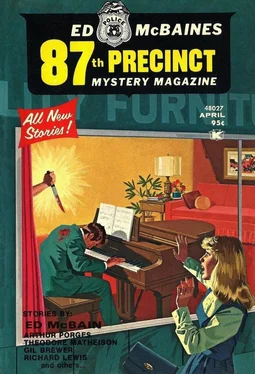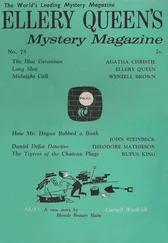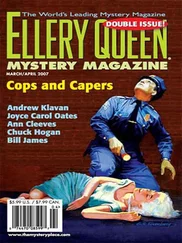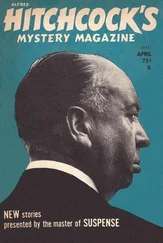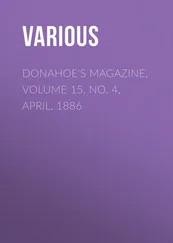Том Годвин - Ed McBaines 87th Precinct Mystery Magazine. Volume 1, No. 4. April, 1975
Здесь есть возможность читать онлайн «Том Годвин - Ed McBaines 87th Precinct Mystery Magazine. Volume 1, No. 4. April, 1975» весь текст электронной книги совершенно бесплатно (целиком полную версию без сокращений). В некоторых случаях можно слушать аудио, скачать через торрент в формате fb2 и присутствует краткое содержание. Город: Los Angeles, Год выпуска: 1975, Издательство: Leonard J. Ackerman, Жанр: Детектив, на английском языке. Описание произведения, (предисловие) а так же отзывы посетителей доступны на портале библиотеки ЛибКат.
- Название:Ed McBaines 87th Precinct Mystery Magazine. Volume 1, No. 4. April, 1975
- Автор:
- Издательство:Leonard J. Ackerman
- Жанр:
- Год:1975
- Город:Los Angeles
- ISBN:нет данных
- Рейтинг книги:5 / 5. Голосов: 1
-
Избранное:Добавить в избранное
- Отзывы:
-
Ваша оценка:
- 100
- 1
- 2
- 3
- 4
- 5
Ed McBaines 87th Precinct Mystery Magazine. Volume 1, No. 4. April, 1975: краткое содержание, описание и аннотация
Предлагаем к чтению аннотацию, описание, краткое содержание или предисловие (зависит от того, что написал сам автор книги «Ed McBaines 87th Precinct Mystery Magazine. Volume 1, No. 4. April, 1975»). Если вы не нашли необходимую информацию о книге — напишите в комментариях, мы постараемся отыскать её.
Ed McBaines 87th Precinct Mystery Magazine. Volume 1, No. 4. April, 1975 — читать онлайн бесплатно полную книгу (весь текст) целиком
Ниже представлен текст книги, разбитый по страницам. Система сохранения места последней прочитанной страницы, позволяет с удобством читать онлайн бесплатно книгу «Ed McBaines 87th Precinct Mystery Magazine. Volume 1, No. 4. April, 1975», без необходимости каждый раз заново искать на чём Вы остановились. Поставьте закладку, и сможете в любой момент перейти на страницу, на которой закончили чтение.
Интервал:
Закладка:
Ed McBaines 87th Precinct Mystery Magazine. Volume 1, No. 4. April, 1975

The Mannequin Murder
by Irwin Porges

The girl, like one yanked abruptly from the darkness of a dream into the glare of electric lights, found herself blinded and confused. For a moment she was in a world of floating colors; then, awareness returning, she discovered the cement under her feet and the stretch of sidewalk about her. The brilliant square of light came from a huge window. Her eyes focusing, she stared and saw the figures take shape. Of course — a department store window, and these were dummies, mannequins, posed in some kind of scene. But she couldn’t recall how she had gotten here.
She gazed about, seeing the grayness at the edge of the light and the blackness beyond. It was late, very late, she felt. Her mind groped for the place and the events. She was in the downtown area, alone, not a soul in view, not even the sound of a footstep. The deep gloom beyond the patch of light brought a sudden touch of fear. She shivered. She turned to the shining window, moving nearer to its bright safety. The scene itself was homey and comforting. She looked at a living room, the furniture and carpets in vivid colors. A man and woman, both gray-haired, sat on a divan, while nearby, a younger woman sat in a club chair. They all seemed poised in listening attitudes. The girl noted the grand piano set to one side and the man who occupied the bench, his hands raised stiffly above the keys.
There was something wrong, some jarring note in the pleasant scene. The man’s mouth strained open, as though to cry out, and his face was oddly contorted. Behind him, emerging from the drapery, an arm slowly descended. The girl stared at the gleam of the silver knife. But she was quickly reassured. The arm moved mechanically, operated by some electrical device. Even now it was rising again, fingers wrapped about the knife. Curious though, how careless somebody had been. The knife would strike wide of its mark — that was obvious. The mannequin was placed on the bench in the wrong position.
Her eyes were drawn again to the pianist’s face with its expression of agony. The red moistness on the forehead was puzzling. Why there? She stared as it trickled down one side. The pianist tilted forward; she could have sworn that he moved. Then he fell face down onto the keys. There was a discordant crash of notes. She cried out. A voice sounded in her ear, and her heart jumped. “Why did he do that, lady? Why?”
She swung around in terror. The liquor breath was overpowering. A bum, a wino, the kind that always roamed the downtown area. A dirty, shaky old man who leaned toward her and appeared menacing. “Lady, please, could you give me some money. I need...”
“Stay away from me,” she said. He moved and she turned to run blindly down the street, out of the brightness of the store into narrow dark lanes that seemed like alleys. After a while she panted, slowed, caught her breath and stopped. She peered about the unlit street in despair. Memories of a car came to her — a car parked somewhere. She heard rustling, scraping noises and ran again down one black street after another. Exhausted, she grew calmer and noticed a pattern of lights in the distance. Soon, she came out on a broad boulevard. Cars passed, some slowly while men called out to her. She stood at the curb, waving frantically at cabs until one stopped.
She tugged the door open and climbed in. As she talked incoherently the cabbie, with the boredom and annoyance of one who has heard everything, interrupted: “Look, do you want to go someplace? I don’t know anything about bodies and store windows.”
“Take me to a police station,” she said. “The nearest one.”
“Police station? Well, if that’s what you want.”
The ride was short, and when she got out, she remembered and gazed helplessly about. “My bag — is it in the cab?”
The man gave her a sour look and turned to search the cab. “No bag, lady,” he announced.
“I guess I lost it,” she said. “I can’t pay you now.”
“Another one of those,” he said in disgust, following her into the station.
The desk sergeant listened for a moment and then raised a hand. “Let’s take things in order. Your name, please.”
“Howard — Charlene Howard.” She faced the cabbie. “I work downtown. I have an apartment. I wouldn’t cheat anybody.”
“Sure, sure,” said the man. “But when do I get my money?”
The sergeant growled. “Hold it. We’ll get to that later. Now, about this bleeding man.”
She told the story, conscious of the disbelief in the sergeant’s gaze. “In the store window?” he said. “That would be Leland’s. Oh, I see.” He sat back and grinned. “I guess it’s scared lots of people. We’ve had complaints about it. Just a display advertising a crime novel, the one that’s a big seller. Did you see the book covers in the window?”
“Of course it was a display. Anybody would know that.” She swallowed her irritation. “But I’ve told you. On the piano bench — it was not a dummy. I saw a man.” She shuddered. “His eyes... I think he was dead.”
The sergeant was studying her. “It’s late,” he said. “About one a.m. You’ve been out, right? Maybe you had one too many... or...”
“I haven’t been drinking. Or anything else.” The moment after she said it she felt confused and bewildered. The sidewalk and store wavered before her. She remembered — they had appeared suddenly, as though she had just awakened from a dream. Both her mind and vision were fogged. She struggled to force some clue out of the blankness, to find some memory of the night. Had she been drinking? How else to account for the dizziness?
“Miss.” The sergeant had been talking. His voice came from far away. “Are you all right? Maybe you’d better sit down.”
Broken details of the night were returning. First there was a bright room, with twirling, flashing colors. Then she was in an enormous gloomy place and around her mocking faces appeared... one man... or was it two?... and a woman. She stared at the sergeant and at the cabbie, aware of the derision in his eyes. “All right,” she cried. “You don’t believe me. A man may be injured or dead. Why don’t you send a policeman to the store? That would settle matters, wouldn’t it?”
The sergeant nodded. “Exactly what I was planning.” He had lifted a phone and given an order. The policeman who entered was introduced as Officer Foster. She gave her office address to the cabbie, promised to pay him extra for his trouble.
In the car she felt the officer’s quick, curious glances. “At Leland’s,” he finally said. “You think there’s something wrong there.”
“Yes, I do.” She sounded defiant.
“People have been upset over the display,” he said. “The mayor was even annoyed. He asked the store to remove it — or at least get rid of that moving knife.”
As they parked and walked toward the glowing window, a couple appeared from a side street. Several men and another woman came from the opposite direction. Strange, she noted, how ail these people showed up now and at this time of the night. When she needed help, she thought bitterly, she could find nobody.
She stood close to the window, hearing the officer’s voice over her shoulder. “What was it you — uh — saw? A bleeding man?”
Читать дальшеИнтервал:
Закладка:
Похожие книги на «Ed McBaines 87th Precinct Mystery Magazine. Volume 1, No. 4. April, 1975»
Представляем Вашему вниманию похожие книги на «Ed McBaines 87th Precinct Mystery Magazine. Volume 1, No. 4. April, 1975» списком для выбора. Мы отобрали схожую по названию и смыслу литературу в надежде предоставить читателям больше вариантов отыскать новые, интересные, ещё непрочитанные произведения.
Обсуждение, отзывы о книге «Ed McBaines 87th Precinct Mystery Magazine. Volume 1, No. 4. April, 1975» и просто собственные мнения читателей. Оставьте ваши комментарии, напишите, что Вы думаете о произведении, его смысле или главных героях. Укажите что конкретно понравилось, а что нет, и почему Вы так считаете.
